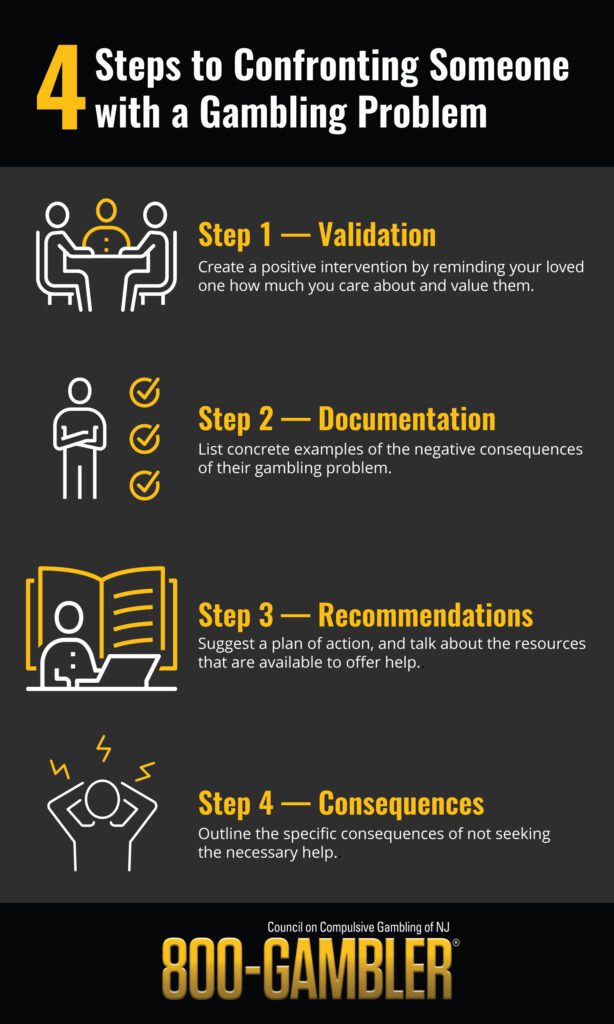
- How To Find Out If Someone Has A Gambling Problem At A
- How To Find Out If Someone Has A Gambling Problem Regarding
- How To Tell If A Person Has A Gambling Problem
If you suspect you or someone you love has a gambling addiction, talk to your doctor or mental health professional. They can help you find the information and support you need.
Take this gambling addiction test to help find out whether you have a problem with gambling or a real gambling problem.
- The effects of a spouse’s addiction can reach far beyond the one who has the addiction. Gambling addictions can, and most often do, negatively impact marriage. According to the Georgia Department of Behavioral Health, the rate of divorce is significantly higher for problem and pathological gamblers than low risk or non-gamblers.
- A problem gambler can find themselves doing nothing more than gambling, sleeping and eating. And even sleeping can suffer. Gambling addicts may find themselves completely preoccupied with gambling, thinking about it for large portions of the day, and looking for more time (and money) to play.

How to Recognize a Gambling Problem
It isn't difficult to determine if a person has a gambling problem. The signs of a gambling addiction or gambling problem are likely apparent to significant others surrounding the person with a gambling addiction. But to the gambling addict who's enmeshed in the world of betting, it's often difficult to see things clearly.
Gambler's Anonymous asks its new members twenty questions. These questions are provided to help the individual decide if he or she is a compulsive gambler and wants to stop gambling. Pathological gamblers usually answer 'yes' to at least seven of these questions:
Gambling Addiction Test: Is Gambling A Problem for You?
Do you really want to know if you have problems with gambling. Answer these gambling addiction test questions honestly.
- Did you ever lose time from work or school due to gambling?
- Has gambling ever made your home life unhappy?
- Did gambling affect your reputation?
- Have you ever felt remorse after gambling?
- Did you ever gamble to get money with which to pay debts or otherwise solve financial difficulties?
- Did gambling cause a decrease in your ambition or efficiency?
- After losing did you feel you must return as soon as possible and win back your losses?
- After a win did you have a strong urge to return and win more?
- Did you often gamble until your last dollar was gone?
- Did you ever borrow to finance your gambling?
- Have you ever sold anything to finance gambling?
- Were you reluctant to use 'gambling money' for normal expenditures?
- Did gambling make you careless of the welfare of yourself or your family?
- Did you ever gamble longer than you had planned?
- Have you ever gambled to escape worry or trouble?
- Have you ever committed, or considered committing, an illegal act to finance gambling?
- Did gambling cause you to have difficulty in sleeping?
- Do arguments, disappointments or frustrations create within you an urge to gamble?
- Did you ever have an urge to celebrate any good fortune by a few hours of gambling?
- Have you ever considered self-destruction or suicide as a result of your gambling?
How To Find Out If Someone Has A Gambling Problem At A

Gambling Problem? What Next?
How To Find Out If Someone Has A Gambling Problem Regarding
If you are concerned about having a gambling problem, even if you just consider if a 'problem with gambling,' print the results of this gambling addiction test and share them with your doctor, a counselor or therapist, or someone else you trust. Problem gambling can be helped with proper gambling addiction treatment.
Sources:
- Gambler's Anonymous
next: Why Do People Gamble
~ all gambling addiction articles
~ all articles on addictions
APA Reference
Gluck, S. (2008, December 16). Do You Have A Gambling Problem?, HealthyPlace. Retrieved on 2020, December 15 from https://www.healthyplace.com/addictions/gambling-addiction/gambling-addiction-test

Last updated: 10/25/2018
Author: Addictions.com Medical Review
Reading Time: 3minutes
For individuals who are suffering from compulsive gambling addiction, life can be difficult on a daily basis. This particular addiction is incredibly damaging to a person’s financial life and many people have had to file bankruptcy simply because they cannot stop gambling. If you feel that a loved one has this addiction, you may want to be aware of the signs that there is a problem. By identifying the signs, you will be able to help the individual overcome this issue.
How to Tell if Your Loved One Has a Compulsive Gambling Addiction
How To Tell If A Person Has A Gambling Problem
One of the first signs to look for when you think someone has a gambling addiction is what they do on a daily basis. Someone who has this type of addiction may exhibit it in a variety of different ways. One person might be an online casino addict and spend the majority of their time on gambling websites. Another person with a gambling addiction might spend a lot of their day buying and screening lottery tickets from local gas stations and convenience stores. Some people are also addicted to actually going to local casinos in their area and playing the machines that are available there.
Don’t let your loved one suffer from a compulsive gambling addiction any longer.
If you are noticing that a loved one is using one or several of these gambling methods on a constant basis, it could mean that they are suffering from a compulsive gambling addiction. You might also notice that someone with this issue constantly complains about money and financial problems. The person might work a steady job but still not have enough money for bills, rent or even food. Financial distress is a major problem that people who have this addiction have to deal with each day.
How to Confront Someone with this Addiction
If you feel that a loved one has this addiction, you may want to confront them about it. This type of addiction is no different from many others because the addict feels the urges to constantly gamble to see if they are able to win big. Confronting someone might mean something as simple as sitting down and asking them if they feel like they have a problem with their gambling. Some people recognize that they have an issue and are willing to get help for it. Others do not even realize that their gambling is an actual addiction and that it is causing problems in their life financially.
Working with a therapist when dealing with someone who has a compulsive gambling addiction can be thoroughly beneficial to both you and the person involved. Without help, a person with a gambling addiction can spiral out of control, lose all of their assets and face financial ruin. Before this happens, the person needs to understand that they have an addiction and that there is help out there for them if they simply reach out for it. Knowing the person who has the addiction will also help when you actually go to confront them about it personally.
Sources:
Signs of a Gambling Addiction
Compulsive Gambling Addiction

댓글